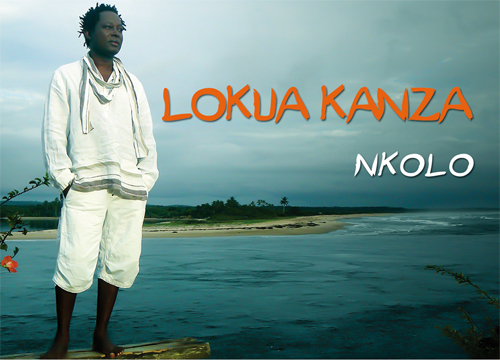Fiche Disque
Musique

ALBUM 2010
Nkolo
Spike Lee

Genre : Album
Style : World
Date de sortie : 25 Mars 2010
Français
« Le nouvel album de Lokua Kanza, ce parfait chanteur épris d’intimisme, épate par sa délicatesse musicale, la finesse et la fluidité des voix »
Le Monde
« Un nouvel album aérien où il renoue avec la veine dépouillée de son coup de maître initial, mais enrichie subtilement par l’expérience accumulée au fil des ans ». Le Nouvel Observateur
« Sixième album du grand chanteur congolais : sobre, tendre, distingué, indispensable ». Les Inrockuptibles
« D’une douceur infinie et merveilleusement compatible avec un paisible entrain, ce nouvel album de Lokua Kanza est de ceux dans lesquels on se love en toute confiance ». Le Journal du Dimanche
Le Monde
« Un nouvel album aérien où il renoue avec la veine dépouillée de son coup de maître initial, mais enrichie subtilement par l’expérience accumulée au fil des ans ». Le Nouvel Observateur
« Sixième album du grand chanteur congolais : sobre, tendre, distingué, indispensable ». Les Inrockuptibles
« D’une douceur infinie et merveilleusement compatible avec un paisible entrain, ce nouvel album de Lokua Kanza est de ceux dans lesquels on se love en toute confiance ». Le Journal du Dimanche
English
The notes from the kalimba and the vocal purity conveyed in the first few beats of’Elanga Ya Muinda’ set the tune (and the scene) for Nkolo, this new album that could well be not only one of Lokua Kanza’s masterpieces but also a landmark in the music of today-no need to mention « world music » in fact. The magic continues with the sinuous swirls of’Dipano’, the tinges reminiscent of negro spirituals emanating from’Mapendo’,’Yalo’ and’Oh Yahwe’, the incantations of’Loyenge’, an interlude with Thomas Bloch and Sylvain Luc, the intimist couplets of’Famille’, a duo with his fellow-countryman Fally Ipupa, and those of’Nkolo’ where the accompaniment is provided by the unsurpassable William Galison on harmonica.
The enchantment works, the magic too, at double strength in the pieces we find ourselves whistling the minute we’ve heard them-whether it’s the haunting refrain and brilliant guitar-maybe straight out of a highlife band?-on’Nakozonga’; or’Soki’ and’Vou Ver’ with their steamy atmospheres direct from Brazil; or’On veut du soleil’ [We Want Some Sun], that hymn to the joys of life that Lokua Kanza chose to sing in Verlaine’s language, as if to strengthen his roots in his country of adoption, the scene of his mounting success, still escalating and showing no signs of stopping.
His voice dominates the ensemble. Sometimes it’s thrown into relief or highlighted by angel choirs, bells, a whistle, drums, a child’s voice… We find ourselves in a world whose keywords are purity and refinement, with a hallmark based on the art of melody, subtlety, charm, a range of low-key nuances, and the merest hint of melancholy, enveloped in serenity combined with a feeling of enchantment or even meditation. Sometimes time seems to stand still…
In spite of his many interests and encyclopedic knowledge of contemporary music of all kinds, Lokua Kanza is very discreet. He now spends his time between Paris and Rio, but doesn’t like talking about himself. If you want to know what he’s thinking, you have to look into his eyes and work out his thoughts-and of course his music. He does just confess, « What I want to do through this album is convey the beauty and depth of the Africa of my childhood; but at the same time, I’ve added something else, a creative touch born of all the influences I’ve been subject to ». And after explaining he’s never felt his voice so close to the music he could hear in his head as when he was composing for this album, he adds with a smile, « I wanted to plant a sort of baobab it would be good to sit under when you’re feeling out of sorts or looking for your roots. »
The enchantment works, the magic too, at double strength in the pieces we find ourselves whistling the minute we’ve heard them-whether it’s the haunting refrain and brilliant guitar-maybe straight out of a highlife band?-on’Nakozonga’; or’Soki’ and’Vou Ver’ with their steamy atmospheres direct from Brazil; or’On veut du soleil’ [We Want Some Sun], that hymn to the joys of life that Lokua Kanza chose to sing in Verlaine’s language, as if to strengthen his roots in his country of adoption, the scene of his mounting success, still escalating and showing no signs of stopping.
His voice dominates the ensemble. Sometimes it’s thrown into relief or highlighted by angel choirs, bells, a whistle, drums, a child’s voice… We find ourselves in a world whose keywords are purity and refinement, with a hallmark based on the art of melody, subtlety, charm, a range of low-key nuances, and the merest hint of melancholy, enveloped in serenity combined with a feeling of enchantment or even meditation. Sometimes time seems to stand still…
In spite of his many interests and encyclopedic knowledge of contemporary music of all kinds, Lokua Kanza is very discreet. He now spends his time between Paris and Rio, but doesn’t like talking about himself. If you want to know what he’s thinking, you have to look into his eyes and work out his thoughts-and of course his music. He does just confess, « What I want to do through this album is convey the beauty and depth of the Africa of my childhood; but at the same time, I’ve added something else, a creative touch born of all the influences I’ve been subject to ». And after explaining he’s never felt his voice so close to the music he could hear in his head as when he was composing for this album, he adds with a smile, « I wanted to plant a sort of baobab it would be good to sit under when you’re feeling out of sorts or looking for your roots. »
Partager :



